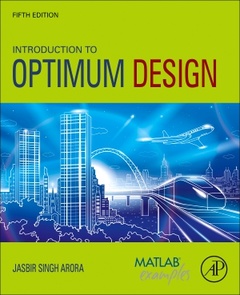Introduction to Optimum Design (5th Ed.)
Auteur : Arora Jasbir Singh

THE BASIC CONCEPTS 1. Introduction to Design Optimization 2. Optimum Design Problem Formulation 3. Graphical Solution Method and Basic Optimization Concepts 4. Optimum Design Concepts: Optimality Conditions 5. More on Optimum Design Concepts: Optimality Conditions
NUMERICAL METHODS FOR CONTINUOUS VARIABLE OPTIMIZATION 6. Optimum Design: Numerical Solution Process and Excel Solver 7. Optimum Design with MATLAB® 8. Linear Programming Methods for Optimum Design 9. More on Linear Programming Methods for Optimum Design 10. Numerical Methods for Unconstrained Optimum Design 11. More on Numerical Methods for Unconstrained Optimum Design 12. Numerical Methods for Constrained Optimum Design 13. More on Numerical Methods for Constrained Optimum Design 14. Practical Applications of Optimization
ADVANCED AND MODERN TOPICS ON OPTIMUM DESIGN 15. Discrete Variable Optimum Design Concepts and Methods 16. Global Optimization: Concepts and Methods 17. Nature-inspired Metaheuristic Search Methods 18. Multi-Objective Optimum Design Concepts and Methods 19. Introduction to Design Under Uncertainty: Reliability-Based Design Optimization 20. Metamodels for Design Optimization: Response Surface Method 21. Robust Design and Optimization - An Introduction 22. Design of Experiments - An Introduction
Appendix A. Vector and Matrix Algebra Appendix B. Sample Computer Programs
- Describes basic concepts of optimality conditions and numerical methods with simple and practical examples, making the material highly teachable and learnable
- Includes applications of optimization methods for structural, mechanical, aerospace, and industrial engineering problems
- Covers practical design examples and introduces students to the use of optimization methods
- Serves the needs of instructors who teach more advanced courses
- Features new or expanded content in such areas as reliability-based optimization, life-cycle optimization of structures, metamodeling, shape and topology optimization
Date de parution : 03-2024
Ouvrage de 1120 p.
19x23.4 cm
Thèmes d’Introduction to Optimum Design :
Mots-clés :
engineering analysis; optimal control; vectors; design variables; constraints; plotting functions; Hessian Matrix; Taylor’s Expansion; quadratic forms; Lagrange multipliers; global optimality; convex functions; nonlinear equations; simplex method; KKT; Quasi-Newton methods; Hooke-Jeeves Method; stochastic methods; swarm optimization; ant colony optimization; robust optimization; Taguchi Method



